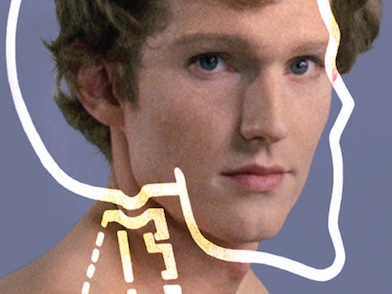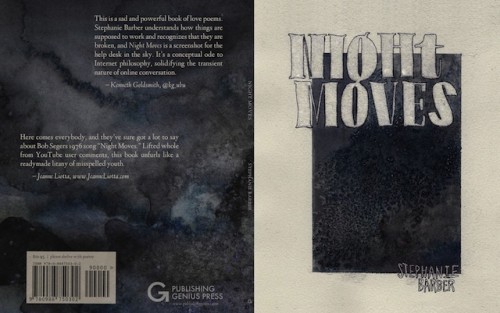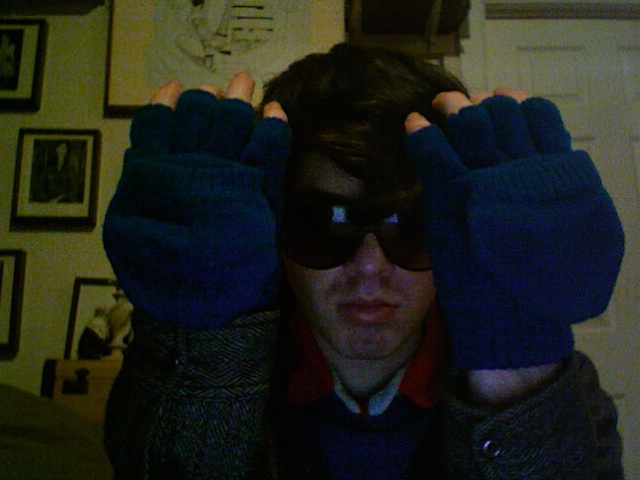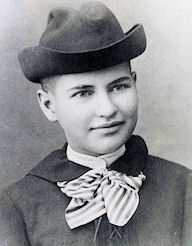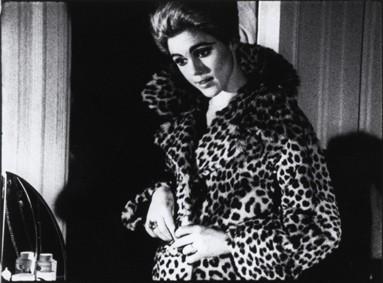That’s Cool: Whole Beast Rag

Nowadays, I feel like half the turdburgers calling themselves editors are convinced that having a couple hundred Facebook likes equates to having a “successful” lit journal (whatever the fuck “success” means is beyond me, because really, who gives a shit about lit journals nowadays). I wonder if those lames realize how easy it is for me to hide their notifications so I can see the important things, like which one of my hoodrat friends is listening to 2 Chainz on Spotify.
Well, anyway, props to Grace Littlefield and Katharine Hargreaves of Whole Beast Rag, which is not a lame lit journal. I met these DABs in Chicago last year, where Katharine gave me her business card (boss alert!) so I could stalk her on Facebook. Back then, they were two doughy-eyed kids from Minneapolis with some big ideas; now they’re on the West Coast, making moves like Suge Knight. They’ve integrated themselves into the LA art scene, and have put together two incredible, beautifully-designed issues for both web and print.
Dressing Up Maggie Nelson
 I first became of aware of Maggie Nelson when I overheard two feminist girls debating whether or not what “she was doing” was ethical. I did not know what “she was doing,” nor did I care. I was forbidden to read her. She was a girl, and for quite a bit it was against the law for me to read girl poets besides, of course, Sylvia. The ban against girls began when a teacher (another feminist, and certainly not the catty, commendable kind) assigned us the Sharon Olds’s poem “The Language of the Brag.” The poem perpetuates the base boast: “I have done what you wanted to do, Walt Whitman, / Allen Ginsberg, I have done this thing.” Oh bother! A demographic whose primary goal is to be like two hairy free-verse guzzling perverts will elicit neither esteem nor heed from me. But then another teacher (a boy one) suggested I read Ariana Reines. Ariana isn’t an intolerably gregarious gay and she isn’t a beatnik-hippie sodomite. Ariana is a monster. In one poem in The Cow, she munches her own poop, sips her throw up, and goes down on herself. She is “self-contained”: disciplined and exacting. She is a sword-sharp: the antithesis of the free verse commoners who are as loose and watery as Barack H. Obama’s negotiating skills.
I first became of aware of Maggie Nelson when I overheard two feminist girls debating whether or not what “she was doing” was ethical. I did not know what “she was doing,” nor did I care. I was forbidden to read her. She was a girl, and for quite a bit it was against the law for me to read girl poets besides, of course, Sylvia. The ban against girls began when a teacher (another feminist, and certainly not the catty, commendable kind) assigned us the Sharon Olds’s poem “The Language of the Brag.” The poem perpetuates the base boast: “I have done what you wanted to do, Walt Whitman, / Allen Ginsberg, I have done this thing.” Oh bother! A demographic whose primary goal is to be like two hairy free-verse guzzling perverts will elicit neither esteem nor heed from me. But then another teacher (a boy one) suggested I read Ariana Reines. Ariana isn’t an intolerably gregarious gay and she isn’t a beatnik-hippie sodomite. Ariana is a monster. In one poem in The Cow, she munches her own poop, sips her throw up, and goes down on herself. She is “self-contained”: disciplined and exacting. She is a sword-sharp: the antithesis of the free verse commoners who are as loose and watery as Barack H. Obama’s negotiating skills.
Obviously after I discovered Ariana and the rest of Rebecca Wolff’s spitfire songstresses my ban against girl poets had to be banned. This meant I could finally read Maggie, which turned out to be marvelous. Maggie is obsessed with ghastliness, terror, and the dead. She devotes “years of compulsion, confusion, and damage” writing about her Aunt Jane, a girl who was viciously murdered while returning home from college. Moreover, she’s compelled by one of the most blessed, articulate, and mischievous girls to ever be forced to live on earth… Anne Frank! “But who can guess / what Anne would have said / about the last place she went,” Maggie tantalizes. Indeed, Maggie has outstanding tastes and curiosities, so I will provide her with three outfits so that she feels fabulous in her wonderfully horrific world.
A lot of little excerpts from and a little critical review of Tomaž Šalamun’s excellent On the Tracks of Wild Game
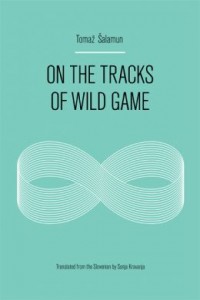 On the Tracks of Wild Game
On the Tracks of Wild Game
Tomaž Šalamun (Translated by Sonja Kravanja)
Ugly Duckling Presse, 1979/2012
108 pages / $14.00 buy from Ugly Duckling
It’s fairly disarming to think of the poetry in Tomaž Šalamun’s On the Tracks of Wild Game as over thirty years old. The poet’s approach to and manipulation of language is frequently unexpected, exciting. Fresh. He sets the bar, here, not only as we look back retrospectively on what the poetry world was approaching at the end of the twentieth century, but also as we ourselves presently work to create and maintain unique, innovative voices. I can imagine this book would generate about as much enthusiasm and dialogue, if published tomorrow, as it has as a translation. The work marks a pivotal appreciation for the Slovenian writer, but more importantly to literature outside the Western canon in general.
The brevity of the majority of the poems is particularly exciting. Šalamun strikes hard with the saying as much with as little as one is able. To me, the untitled poems, fleeting yet devastatingly moving in their images and volatile turns of language, reminded me of Bashō and other Japanese poetry I’ve read translated by Kenneth Rexroth.
The simplicity drives the purpose behind the works. Šalamun is able to transform the direction and force of these moments usually in one or two words. Notably it is the function of the ending, which takes a good poem and makes it an awesome poem. “When will I be captured / by the breadth of this honey?” (8) and “where did your women hide / as you fled to this tree?” (9) are early examples of how powerful a tiny image, a markedly heretofore unestablished or dramatically appearing image is responsible for the weight and reaction of the poem. Ending, here, on a question, is complex: it operates as a turn from writer to speaker to reader, an introspection on the speaker’s part, and an endowment of agency and participation from the literary context to the reader.
February 13th, 2013 / 2:41 pm
The collected films of B S Johnson are finally getting a video release
Entitled You’re Human Like the Rest of Them. Both DVD and Blu-Ray formats (Region 2 / PAL). Comes out on 15 April. Includes:
- You’re Human Like the Rest of Them (1967, 17 mins): multi-award-winning tale of a teacher confronting his own mortality [click here & here for more info]
- Paradigm (1968, 9 mins): William Hoyland gives a performance of supreme virtuosity in this arresting experimental film
- The Unfortunates (1969, 15 mins, DVD only): Johnson brings aspects of his book to life in this short BBC TV film
- Up Yours Too Guillaume Apollinaire! (1969, 2 mins): humorous animated take on the calligrams of the famous poet and eroticist
- Unfair! (1970, 8 mins): provocative agitprop piece with Bill Owen
- March! (1970, 13 mins): documentary made for the ACTT union
- Poem (1971, 1 min): poignant short set to the words of Samuel Beckett
- B. S. Johnson on Dr. Samuel Johnson (1972, 26 mins): a learned and full-bodied appreciation of the great writer
- Not Counting the Savages (1972, 29 mins, DVD only): Mike Newell s adaptation of Johnson’s intense play, made for BBC TV’s Thirty Minute Theatre
- Fat Man on a Beach (1974, 39 mins): part documentary, part creative exploration, this was a highlight of 1970s TV programming
This should be enough to make anyone’s Fat Tuesday.
& if you haven’t read B S Johnson, then what can I say but you’re missing out.
Bonus movie review: I watched the 2000 movie adaptation of Christie Malry’s Own Double-Entry, one of my all-time favorite novels. I’m sorry to report that it was awful.
A Few Things
I think everyone should be as concerned about their art as Lily and her mommy are:
The organizers of The Hunger Games academic conference have released a list of their panels.
Megan Milks’s choose your own adventure book is sweet and sharp. Baby Adolf and Baby Joseph like it as well.
This is an insightful song about girls.
NIGHT MOVES
Stephanie Barber’s new book, NIGHT MOVES (Publishing Genius), is an exquisite corpse-style collection of YouTube comments on the Bob Seger classic. It is one long epistolary poem comprised of many short poems.
The text at once contains lost youth, a melancholic longing for past loves, as well as the potential for chaos, connection, vitriol and fun within the realm of internet anonymity. NIGHT MOVES also depicts the range of responses that one piece of art can elicit, from fierce loyalty to disdain, deeply personal symbolism to some shit that somebody found by way of 30 Rock. The question of what defines poetry — found, conceptual, or otherwise — and of who can be called a “poet” is never far from the surface. Here are a few excerpts:
To Julie… where ever you are. I STILL remember the first time I saw you in psychology class, 10th grade, spring of “76”. You made the nights move for me 77-78. I will carry those memories in my heart forever, and only stop, with the last beat of my heart….
points all her own sittin way up high… << what does that mean?
I can really relate to this song as I have a daughter that is a product of the “Night Moves” and you can bet that she knows it. She is still working on the “Night Moves” what a Gal!!
NYE – OH NO WERE NOT FAR FROM IT AND AUTUM CAN’T CLOSE IN BEFORE I HAVE U TO LOVE FOREVER!! NO BACK ALLEY TRUSTED WOODS FOR MY BABYGIRL ANY MORE, BECAUSE WE DO HAVE TOO MUCH TO LOSE!! I LOVE YOU !!DADDY!! I’m coming for you soon!! OUR LOVE WILL NEVER END! REMEMBER WHEN WE WERE LIKE THIS SONG ? IM SO GLAD WE WEVE FOUND EACH OTHER ONCE MORE. IM IN LOVE WITH YOU MORE N MORE EACH DAY! (PURE) DADDY
88 people didn’t get any in high school…
Gina will never know the truth
The 60,s from Nam to Woodstock you had to experience it.God Bless America
u gotta loveee bob segar u fag, it seems like you have devoted ur fag life into talkin about bob segar
hell, i’m 81 and i love this song. anyone who was ever young has to choke a little when you hear it. it’s the best anthem of youth ever written
got me knocked up in 84
wtf is a pie in the sky summit?
this song makes me so nostalgic it actually hurts
Me too man, me too
NIGHT MOVES is a strange combination of dusty Polaroid-old and lol-contemporary. It also presents an intersection between universality and pop, and the ways that pop culture can summon universal emotions or be, in itself, a shared experience. I don’t think this book would have worked so well had it centered around Rhiannon, Dream On, Show Me the Way, Slow Ride, Dream Weaver, Carry On Wayward Son, or any other classic from the same year. There is an inherent nostalgia in the song Night Moves, an awareness of itself aging, of “autumn closing in,” which makes it a catalyst for worshipful confessions from the lovers and hilarious takedowns from the haters. I asked Barber, a Baltimore filmmaker whose work has been screened at MOMA and The Tate Modern, some questions:
hey i just met you and this is crazy but here’s my url so buy me maybe?
A Little Video For My First Chapbook, macey [triolets], and A Picture of Mittens
My first chapbook, macey [triolets], has been published by Birds of Lace, and may be purchased now for five U.S. dollars.
I made a little video for it featuring music by DMX and Sisqo
Also, the weather is finally freezing, so everyone can wear mittens, and mittens are so cute, you absolutely have to post pictures of outfits that include them.
Clothing Credits: mittens by Urban Outfitters, coat from a shop in Missouri, vintage sweater, Penguin collar, sunnies from a Chinese person’s store on the Lower East Side.
January 23rd, 2013 / 3:13 pm
Three Outfits for the Teacher Boy from Willa Cather’s The Professor’s House
During Christmas Break I, along with two dear, marvelous, mythological kitties, convened a book club concentrated around girls. We read a remarkable amount of literature by ladies. The non-boy authors included Marisa Meltzer’s review of sass in the relatively recent music business, Caitlin Flanagan’s charmingly 50s housewife advice on how to treat your daughter, and the Great Plains gal Willa Cather. The last of these non-boys caused the sharpest reactions amongst the book club members. Willa’s exacting, singular, and peculiar worlds wound up the kitties to such an extent that they cried, moaned, groaned, and dispensed caca in places where politer creatures wouldn’t dare dispense caca.
I, too, was enchanted by Willa; especially Professor Godfrey St. Peter, the teacher boy in The Professor’s House. Unlike most feminists and nearly all LGBTQ’s, St. Peter isn’t thirsting to earn entrance into un-movielike white America. St. Peter pulsates with literature. He composed an eight-volume study on Spanish Adventurers. Insight is the sole currency that concerns the professor. When Oxford awards him a prize of five thousand pounds St. Peter informs his wife, “If with that cheque I could have brought back the fun I had writing my history, you’d never have got your house. But one couldn’t get that for twenty thousand dollars. The great pleasures don’t come so cheap.” A new crib is zilch compared to learning, and, obviously, one should collect knowledge in wonderful clothes, which is primarily why I shall now take up the task of dressing St. Peter.
A Rebuttal to Nina Power’s Infuriating Review of Preliminary Materials For a Theory of the Young-Girl
I intended to spend today (29 Dec. 2012) staring out the window and starting a list of all the reasons why kitties were superior in every single way to humans. However, my plan was pummeled to pieces when, through Facebook, I came into contact with Nina Power’s review of Tiqqun’s (trans. Ariana Reines) Preliminary Materials For a Theory of the Young-Girl. I am a boy. I like monster trucks and Arthur Rimbaud. But, even though I’m not a young girl, I still contain an awful amount of admiration for how Tiqqun (a French collective of theorists and artists) depicts the young girl, and I did not appreciate Nina Power’s patronizing, neo-liberal evaluation of it.
So, now, I am impelled to illuminate the wrongness of her ways.
December 29th, 2012 / 4:57 pm

